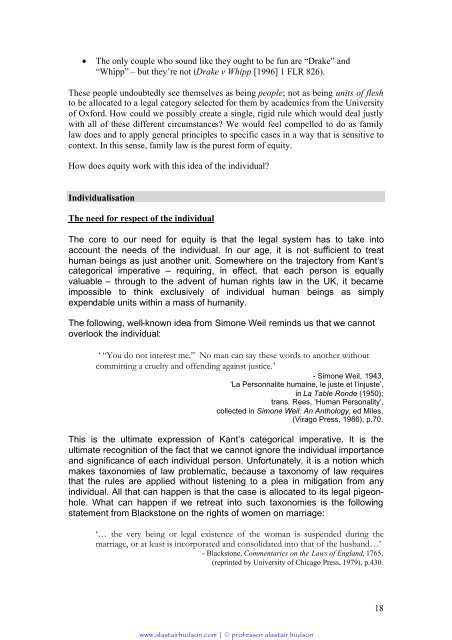England's dreaming equity, trust and conscience - alastairhudson.com
England's dreaming equity, trust and conscience - alastairhudson.com
England's dreaming equity, trust and conscience - alastairhudson.com
You also want an ePaper? Increase the reach of your titles
YUMPU automatically turns print PDFs into web optimized ePapers that Google loves.
The only couple who sound like they ought to be fun are “Drake” <strong>and</strong>“Whipp” – but they’re not (Drake v Whipp [1996] 1 FLR 826).These people undoubtedly see themselves as being people; not as being units of fleshto be allocated to a legal category selected for them by academics from the Universityof Oxford. How could we possibly create a single, rigid rule which would deal justlywith all of these different circumstances? We would feel <strong>com</strong>pelled to do as familylaw does <strong>and</strong> to apply general principles to specific cases in a way that is sensitive tocontext. In this sense, family law is the purest form of <strong>equity</strong>.How does <strong>equity</strong> work with this idea of the individual?IndividualisationThe need for respect of the individualThe core to our need for <strong>equity</strong> is that the legal system has to take intoaccount the needs of the individual. In our age, it is not sufficient to treathuman beings as just another unit. Somewhere on the trajectory from Kant’scategorical imperative – requiring, in effect, that each person is equallyvaluable – through to the advent of human rights law in the UK, it becameimpossible to think exclusively of individual human beings as simplyexpendable units within a mass of humanity.The following, well-known idea from Simone Weil reminds us that we cannotoverlook the individual:‘ “You do not interest me.” No man can say these words to another without<strong>com</strong>mitting a cruelty <strong>and</strong> offending against justice.’- Simone Weil, 1943,‘La Personnalite humaine, le juste et l’injuste’,in La Table Ronde (1950);trans. Rees, ‘Human Personality’,collected in Simone Weil: An Anthology, ed Miles,(Virago Press, 1986), p.70.This is the ultimate expression of Kant’s categorical imperative. It is theultimate recognition of the fact that we cannot ignore the individual importance<strong>and</strong> significance of each individual person. Unfortunately, it is a notion whichmakes taxonomies of law problematic, because a taxonomy of law requiresthat the rules are applied without listening to a plea in mitigation from anyindividual. All that can happen is that the case is allocated to its legal pigeonhole.What can happen if we retreat into such taxonomies is the followingstatement from Blackstone on the rights of women on marriage:‘… the very being or legal existence of the woman is suspended during themarriage, or at least is incorporated <strong>and</strong> consolidated into that of the husb<strong>and</strong>…’- Blackstone, Commentaries on the Laws of Engl<strong>and</strong>, 1765,(reprinted by University of Chicago Press, 1979), p.430.18www.<strong>alastairhudson</strong>.<strong>com</strong> | © professor alastair hudson













